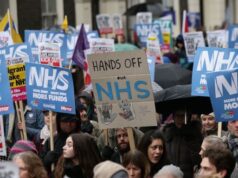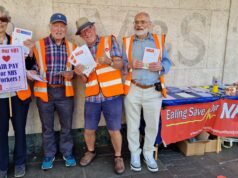SUMMARY
The ‘Case for Change’ document proposes far ranging organisational plans, the content of which is quite undeveloped or even non-existent. There is a clear intention, however, to introduce rigid budgets which would inevitably lead to patients being denied treatment.
A confidential NHS document recently passed to Ealing Save Our NHS reveals that North West London NHS had a cumulative deficit (i.e. underfunding) of £324 million by 2018/19. A central response to this in the document is apparently to “stem growth of activity”. In other words, to cut existing health services.
We believe this is the background to the “Case for Change” and the main reason we find it to be unsupportable.
AN INBUILT LACK OF CLARITY
The Forward to the Case for Change document starts thus:
“This Case for Change document is written in response to the NHS long term plan…. The long term plan raises other issues: how a NW London integrated care system would operate; how integrated care partnerships (ICPs) would develop at a more local level and the development of primary care networks.”
Unfortunately in our view, the document doesn’t live up to this challenge as it fails to explain just how the Integrated Care System (ICS) would work, nor how the proposed Eight ICPs would work. It is also vague about the development of Primary Care Networks.
The introduction continues: “This document focusses on the first of those issues- a proposed change that would see NW London moving from eight CCGs to a single CCG.”
So even at the start it’s unclear whether we are talking about integrated care partnerships or about CCGs. We believe this ambiguity reflects the fact that decisions have yet to be made.
The Case for Change also says: “We want to eliminate the administrative burden that comes from running eight statutory organisations”. But they are statutory organisations, so how can they be replaced? Even merging them into a single CCG is legally dubious. The proposed solution seems to be keeping a CCG or CCGs and running a whole new structure of ICS and ICPs alongside, which obviously increases the administrative burden.
This lack of clarity is repeated throughout the whole document – a document, which claims to lay the framework for the NHS in a fifth of London with a budget of around £5 billion pounds.
Ealing Save Our NHS shares the view already expressed by other organisations that the document cannot be supported.
THE LEGACY OF SHAPING A HEALTHIER FUTURE AND ITS SUSTAINABILITY AND TRANSFORMATION PLAN (STP)
If ever there was an example of officials ignoring the nakedness of the Emperor, it was the doomed Shaping a Healthier Future Plan for North West London, which, along with the STP, is to be replaced by a ‘Case for Change’. Surely before NHS bosses embark on yet another re-organisation, they must make some public assessment of what’s gone wrong so far. They can’t pretend it didn’t happen!
Every re-organisation necessarily impedes front line staff from settling down to the job. It moves experienced people around, demoralises many and frequently empowers the managers at the expense of clinical staff. If there is no balance sheet of the disastrous SaHF, with its huge waste of money and time, how can we have any confidence in new proposals?
Some of the same people, who wasted possibly £200 million worth of NHS money in North West London on SaHF, have now put their name to the Case for Change! Are we honestly supposed to pretend the last seven years of attempts to apply SaHF never happened? Are we still to pretend the Emperor was clothed?
Many mothers in Ealing are distraught at the loss of Maternity and Paediatric services in Ealing Hospital – yet these awful closures of important services are claimed as somehow being “successes” for SaHF. Meanwhile, even after the official demise of SaHF, Ealing Hospital has continued to have services removed and there is clearly no strategic view of its future. It seems as though North West London senior managers are content to allow our local hospital to drift while they address their own organisational structures. Ealing Save Our NHS firmly believes this would not be allowed to happen to a hospital based, not in Southall, but in an affluent part of London.
Until the focus is on the needs of the communities, especially the neediest communities, local people are unlikely to support yet another re-organisation.
We do of course welcome moves to cut spending on administration:
“Maintaining eight separate statutory bodies is difficult to justify when there is so much pressure on health spending, and each statutory body costs an average of about £680k to run.”
What the ‘Case for Change’ annual £680k figure for running each CCGs refers to is a mystery because data from the latest NHS NWL Annual Reports of the 8 CCGS reveals total ‘workforce/employee benefits’ of over £80 million.
There is of course no mention of the millions of NHS money given to outside management consultants for the failed ‘Shaping a Healthier Future’ plans. This amounted to £76 million between 2009 and 2017, at which point SaHF stopped publishing the figures. Is this just to be shrugged off?
THE CASE FOR CHANGE PROPOSALS
“We want to … move towards greater integration with the eight local authorities in NW London. We believe doing so will enable us all to achieve more for our residents in improving health and care services within the budgets we have.”
This statement and others, though typically vague on detail, sets alarm bells ringing for more than one reason.
There are huge differences between local authorities and NHS services, in that local authorities are elected and accountable to the public. If decisions are taken jointly in committees with unelected NHS staff appointed centrally, this accountability would effectively be lost. There is no commitment in the ‘Case for Change’ that the ICP meetings of local authorities and NHS managers would even be held in public, like the CCGs, let alone any suggestion of accountability.
The other fundamental difference between the NHS and Local authority provided social care is that NHS services are free. It has often been pointed out that a person with dementia is faced with losing all their property including their house as they have to pay for social care, whereas the identical person with cancer would receive free treatment from the NHS. There are no assurances that combining budgets would not take us towards more care being charged for.
Even more concerning is the mention of services provided ‘within the budgets we have’. This is just one of several references to fixed capitated budgets not based on patient need.
For some time, it has been suggested that the underfunding of the NHS has been partly motivated by a philosophy of some in Government that more NHS services should be paid for as part of a deliberate ‘shrinking of the state’. The proposition of the Long Term Plan to merge NHS and social care budgets does nothing to dispel that fear.
The proposed Integrated Care Partnerships appear to be motivated by centralised budget cuts. The proposed ‘Partnership’ would seem to be one of junior partners being overseen, at least in part, by a North West London strategic body (the ICS), in turn overseen by NHS London, NHS England and the Health Minister.
Exactly how will it work? The document doesn’t say, presumably because they don’t know. The only clarity is that budgets would be restricted and consequently cuts enforced. One code for this is “move away from payment by results”. Apart from introduction of that key centralised financial straitjacket, it seems most other things are still vague for the grass roots level, presumably because:
“The operating model to determine functions which continue at local level will be developed over the summer as part of the engagement process. We need to develop further the framework for ICP development and encourage those who are furthest ahead to make progress.”
Despite the inability to develop plans in key areas, the ‘Case for Change’ aks us to endorse drastic new organisational plans. In summary there would be an Integrated Care System (ICS) Board, a Clinical Commissioning Group (CCG) Governing Body, an STP Partnership Board, 8 Place (Borough) Teams’, ‘Local Committees’’, 8 Integrated Care Partnerships (ICPs) and 47 Primary Care Networks (PCNs) management teams. All centrally controlled with fixed budgets for a huge area with massive variations of problems.
Will there be separate plans and separate budgets or a single plan and separate budgets or a single plan and a single budget? Answer – not decided.
It’s no wonder that elected Councillors for local Boroughs have a wide range of concerns which included inadequate time to assimilate the changes for a 1 April 2020 start date, financial risks, budget organisation, how it will actually work in practice, cuts to services, no business case and staffing uncertainties.
So little has been worked out or decided – this is a senior NHS management demanding a free hand to make sweeping changes.
CENTRALLY RESTRICTED BUDGETS WOULD REPLACE PATIENT NEED
“A move to a single CCG will also support the move away from the payment by results system towards capitated outcome-based budgeting, support consistency and equity in our methods for engagement, and simplify system wide financial planning.”
“At the end of financial year 2018/19 the eight CCGs in NW London had collectively overspent their budgets by £56.7m – we aim to manage our spending within our budgets.”
“Over 30% of patients in acute hospitals do not need to be in an acute setting and should be cared for in more appropriate places”
Put these three extracts from the ‘Case for Change’ together and a frightening picture emerges. Already the LNWUH Trust was retrospectively refused funding for A&E patients, simply because numbers had exceeded an anticipated target. Having been denied funding in an unprecedented manner, Trusts are told they are ‘in deficit’ and should not ‘be rewarded for the so-called overperformance of vital services.
This is quite patently not clinically driven policy but cuts driven policy. The new system would mean that patients would inevitably be denied treatment.
‘NHS NWL has stated publicly that as these are just organisational changes and will not impact care services, no formal public consultation will be needed. However, as fixed priced budgets seem to be a central part of the reform commissioning package this would certainly impact on patient services by reducing, or at worst eliminating, some care services. Given this, surely the public must be formally and transparently consulted about these major changes.
ACCOUNTABILITY REPLACED BY ‘ENGAGEMENT’
We have already made reference to the possible undermining of the current accountability of local authorities through merging social care into ICPs.
The refusal to examine the SaHF collapse highlights a cavalier attitude to accountability. If eye-watering sums of money can be wasted, thousands of staff demoralised and services cut in a failed project, how can the very same people expect support for a new project?
The Case for Change document has no proposals for public accountability. Accountability is one thing – engagement another. It’s well known that for all its strengths, the NHS has always suffered from a democratic deficit relative to many other public services.
Currently the 8 CCGs do at least meet in public and are borough based and subject to scrutiny by local authorities. But a year ago the CCGs were collectively all given a new boss and expected to integrate their policies. The fig leaf of them being independent and clinically led was thus removed at a stroke!
Would the proposed ICPs (however they are constituted) meet in public? We are not told. The single CCG would do so, but a single CCG covering the whole of North West London would be remote from all local communities and of interest only to a dedicated minority and then only if they had the time and ability to travel across London. Furthermore, this single CCG would be subject to the decisions of the ICS, made presumably behind closed doors.
In a nod to the tax-paying public and patients, the ‘Case for Change’ proposes establishment of a huge focus group called a “citizens’ panel” to be managed no doubt by the public relations/engagement team. Of course focus groups have their place, but they are a tool for senior management and should not be confused with public accountability. It’s hard to imagine that the poorest from our communities would have a strong voice in this focus group.
Likewise Healthwatch. The Case for Change states that “Healthwatch has always been represented in our entire governance structure and will continue to be so. Their active participation has enabled effective engagement across NW London, regular patient involvement in project development and implementation.”
During the seven years of huge public opposition to the Shaping a Healthier Future our local Healthwatch, the ‘official’ vehicle for public participation, barely even mentioned SaHF, let alone questioned this disastrous project in any way. Instead it focussed mainly on patient surveys requested by the CCG.
So in our view although Healthwatch no doubt has a useful purpose, it must be recognised as a wing of the health authorities and cannot be seen as representing the broader views of the public.
IN CONCLUSION
A team from Ealing Save Our NHS recently had the opportunity of a short meeting with the Accountable Officer and the opportunity to share our concerns. Helpful as this was in some respects, we were of the view that the ‘Case for Change’ was still extremely undeveloped. It became clear that proposals are deliberately kept fluid in many respects. For example there is no clarity on the functioning of the CCG in relation to boroughs, let alone how the ICPs would work.
Furthermore some hitherto existing categories such as what constituted an NHS District General Hospital are to be disregarded in favour of more fluidity. This reads like a free hand for the centre and a loss of clinical decision making in favour of centrally ordered rigid budgets.
A recent update provided for the North West London local authorities Joint Health Overview and Scrutiny Committee (JHOSC) failed to substantially address any of this detail, apart from lists of commissioning and management areas of responsibility.
It’s therefore the strong view of Ealing Save Our NHS that to push all this through in the next few months as proposed would in our view be irresponsible.
NHS NWL has as yet failed to produce even a draft NHS NWL Long Term Plan. Clearly it would be putting the cart before the horse to introduce underdeveloped organisational changes before having an approved regional 5 year Long Term Plan to service the care needs of 2.2 million residents, let alone rushing it through uncompleted.
Finally, it’s our belief that the rigid budget system underlying the Case for Change would inevitably lead to a loss of services to patients. Those with money might be able to purchase these lost services, but others certainly could not, further undermining the principle of Health Services for all.
4 August 2019




